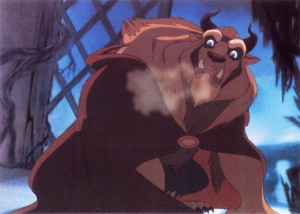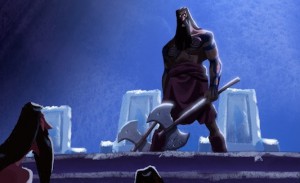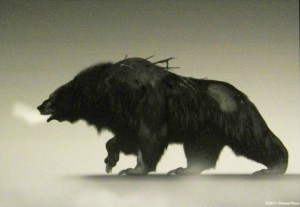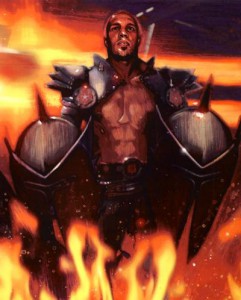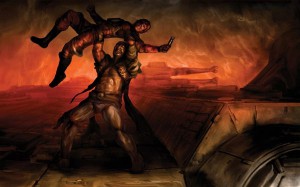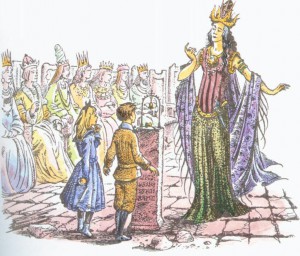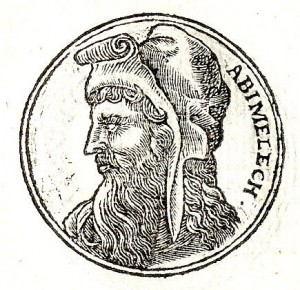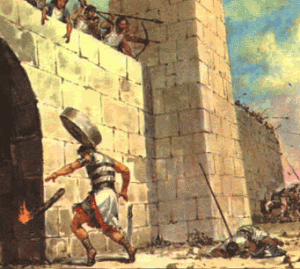Five different people: Prince Adam (Disney’s Beauty and the Beast), Mor’du (Disney’s Brave), Kar Vastor (Star Wars), Jadis (Narnia), and Abimelech (Bible, Judges). The common theme that connects them: the decision to place their desire for power ahead of the bonds of human love.
What originally struck me about all of those mentioned is the common pattern: they reject connection to others for the sake of exalting themselves. Each of them had a crucial moment when they ignored morality to gain greater domination, and that decision affected them in terrible ways; the Judeo-Christian worldview refers to this as “gaining the world and losing your soul.” Of the five, only one seeks redemption; the others all choose to accept their condition and all it entails. Let’s examine each one, shall we?
Prince Adam is a French royal turned into a beast. The reason: his heart was like that of an animal, seeing others only as a means to fulfill his own hungers. Additionally, his servants were all turned into ornaments/objects; why, you ask? The answer: because he saw them as such, and they did nothing to dissuade him from this perception, thus sharing in his fault. His only hope: learn to be human again before time (measured by a gift he previously refused) runs out, or remain a beast forever.
Here is another man turned into a beast, this time by choice. Mor’du’s lifetime serves as a prologue to “Brave;” as a human, he instigates a civil war with his brothers because of his selfish desire to be sole heir of their father’s kingdom. Trapped in a stalemate, he chooses the shape of the bear to gain the strength to defeat them. Like Prince Adam/the Beast, he has the chance to redeem himself by reconnecting with human nature, but he rejects it. As an unfortunate side-effect, he loses his human mind and becomes a nearly indestructible monster, fighting against all the Highland clans as they seek to destroy him.
The main antagonist of the Star Wars novel “Shatterpoint,” Kar is a cousin to Mace Windu (Samuel L. Jackson’s character). After seeing his family slaughtered by prospectors, a young Kar fled into the jungles of his homeland. All his people could use the Force to some degree, but Kar reached an unprecedented level of power by sacrificing his human nature (as well as the ability to speak). He then becomes an avatar of darkness, driven by violence and killing without regard for life or morality.
The main antagonist from two books in C.S. Lewis’ “The Chronicles of Narnia,” Jadis is the last empress of Charn (her original world) and self-proclaimed queen of Narnia. In “The Magician’s Nephew,” she recounts the civil war with her sister, ended with “the Deplorable Word,” a use of magic comparable to a worldwide atomic bomb. She later seeks immortality in Narnia by means of a tree that grants everlasting life to whoever eats one of its apples. However, she pays a terrible price for these victories; in Charn she destroyed all life (aside from herself), and in Narnia her appearance was altered (skin turned pale as salt). A deeper consequence was that she had to live with the memories of all she had done, as well as the depravity of a conscience stripped of morality (Aslan: “length of days with an evil heart is only length of misery”).
A real man from history, the Bible introduces Abimelech as one of the sons of Gideon, a ruler/”judge” from ancient Israel. He persuaded his mother’s people to support his bid to become ruler, and with their backing killed all but one of his brothers. He later turned on his own people and began a reign of terror that ended when a millstone was dropped onto his head. Although he is mentioned in Judges, Abimelech is recognized only as a bloodthirsty tyrant; rather than being appointed by God to save Israel from a foreign oppressor (the role of the true judges), he is instead the oppressor from within, a usurper who tries to seize power that is not his to claim.

